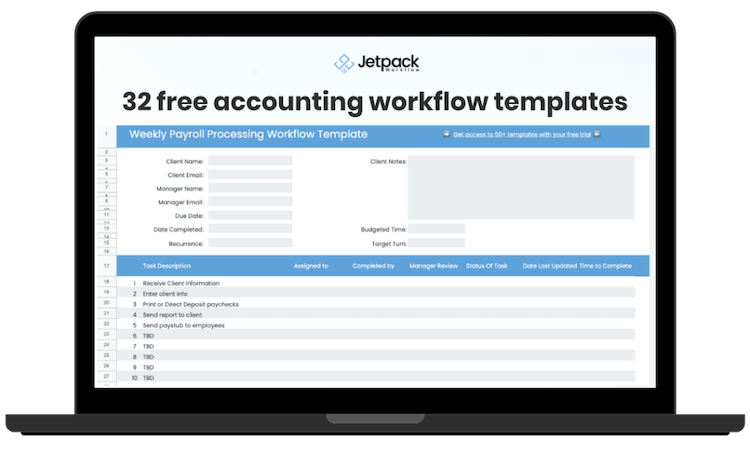5 Key Tips to Better Manage Your Accounting Team’s Workload

Managing your accounting team’s workload as a CPA or accounting firm owner can be time-consuming, especially when you feel like you’re drowning in work.
From juggling multiple clients to meeting shifting deadlines, tracking everything your team is working on (let alone ensuring everything is completed on schedule and to your client’s satisfaction) is a challenge.
In this article, we’ll focus on five specific tips you can use to better manage your accounting team’s workload. We’ll cover everything from creating accounting pods to emphasizing training and development.
In addition, we’ll share practical advice and tools for implementing each tip and real-life examples of how other accounting firms and CPAs successfully use these strategies to improve their team’s productivity.
These tips are designed to help you streamline your workflow, prioritize your team’s workload, and provide a supportive and positive team culture.
1. Create Accounting Pods
Organize your accounting team into smaller groups, or “pods,” that can focus on particular tasks or projects. This kind of structure allows for more efficient workload planning and management of current workloads. Accounting pods provide several benefits, including:
- Enhanced resource allocation and improved team capacity
- Ability to prioritize and split up a list of projects among different pods
- More accurate tracking of progress across multiple projects
- Greater efficiency in the delegation of tasks to the right team member
David Worrell is a partner and CFO at Fuse Financial Partners. During a recent interview with Jetpack Workflow, he explained how his firm structures accounting pods to create an exceptional client experience:
“We try to be such a flat organization, mentally and culturally, and not try to have bosses and org charts. But you start to struggle once you reach seven or eight people. At about 10 people, we split the team into two teams. Each team has a separate accountant, controller, and CFO on it, and they self-manage themselves. So it looks a little bit like cell manufacturing.”
You can watch the full interview here:
2. Adopt a Workflow Software
Workflow software automates various tasks and processes to simplify an accounting team’s operations. Utilizing software can lead to faster and more efficient completion of accounting tasks.
Rather than manually typing up invoices, making phone calls, or entering data into systems, this software can automate these processes giving the team more time to focus on other aspects of their job. Benefits include:
- Reduced time spent on tedious data entry
- Enhanced accuracy of data processing
- Improved communication and task tracking between team members
- Automated notifications for completed projects or tasks
- Increased visibility of current workloads to better manage team capacity
This is why we built into Jetpack Workflow. With real-time capacity planning and team management features, you get the answers to questions like these: What is my team working on? Are they on track to complete their work this week? What’s coming up that I need to plan for?
Start your 14-day free trial today and see how Jetpack Workflow can help streamline your operations and improve your team’s workflow process.
3. Create an Incentive Structure
An effective incentive structure is key for any accounting team looking to optimize their productivity. This type of system helps motivate and drive professionals to work harder and complete tasks faster and with higher quality.
Use this structure to reward accomplishments such as successful project completions or meeting deadlines on time. Incentive structures also help set a positive working atmosphere and create competition among the team, which can lead to more creative solutions and better results:
- Boost team performance through healthy competition, leading to higher productivity.
- Motivate accounting professionals to produce higher quality work, improving financial statements, cash flow, and financial reporting.
- Increase team availability by offering incentives for additional tasks or working overtime.
- Identify the most productive members of the accounting team, which leads to better management decisions.
Craig Hausz (a former Arthur Anderson employee) and his wife are the co-founders of CMH Advisors, where he leads growth activities, vision, and strategy. Their passion for helping everyone drives them to develop tax and financial strategies so clients can achieve their goals.
Since 2014, CMH Advisors has grown from a team of two to 12, servicing clients in over 40 states. During an interview on the Growing Your Firm podcast, Craig had this to say about the incentive structure his company uses:
“We set up an incentive structure that says if you’re above your billings target, we’re going to add 20% of that amount on top of it, then bonus you each quarter. It was amazing how much more efficient everybody became toward the end of the quarter. On the one hand, they didn’t want to stay past 6 o’clock, but on the other hand, they wanted to knock that number up as much as they could.”
You can watch the full interview here:
4. Prioritize Regular Check-Ins
Keeping a team organized and aligned for a common goal can be challenging, especially with remote work or when the team has multiple due dates for different clients. To manage these challenges, prioritize regular check-ins to ensure everyone is on track and work is completed on time. Scheduling regular check-ins has an array of benefits, including:
- Improved timelines through understanding dependencies and deadlines
- Reduced workplace stress through transparency and communication
- Increased accountability through forums to discuss issues and opportunities
- Greater collaboration by ensuring team members understand their tasks
It’s common for employees to bottle frustrations and let them boil. So having regular discussions where team members can voice their opinions and share what they’re working on can help you identify ways to improve what they’re doing, or get them the help they need.
5. Emphasize Training and Development
Emphasizing training and development can be a game-changer for CPA and bookkeeping firms. Not only does it give employees the opportunity to grow professionally, but it helps ensure clients receive the highest level of service. There are numerous advantages, such as:
- Improved workplace productivity through the use of workload management tools, task management software, and to-do lists
- Reduced burnout by spreading workloads more evenly between team members
- Establishing clear expectations in completing specific tasks
- Greater employee job satisfaction and motivation
By investing in their employees, firms enjoy increased employee retention, more efficient workflows, and ultimately, stronger client relationships. Taking the time to emphasize employee training and professional development makes a lasting impact on any CPA firm or bookkeeping business.
BONUS: Simplify Your Accounting Workflows with This Free Resource
If you’re looking for simple workflow templates to stay on top of your projects and tasks for clients, access our collection of 32 customizable accounting workflow templates and checklists here. This free resource includes a ton of the most popular accounting templates including monthly bookkeeping, weekly accounting analysis, client onboarding procedures, and common tax return forms.






